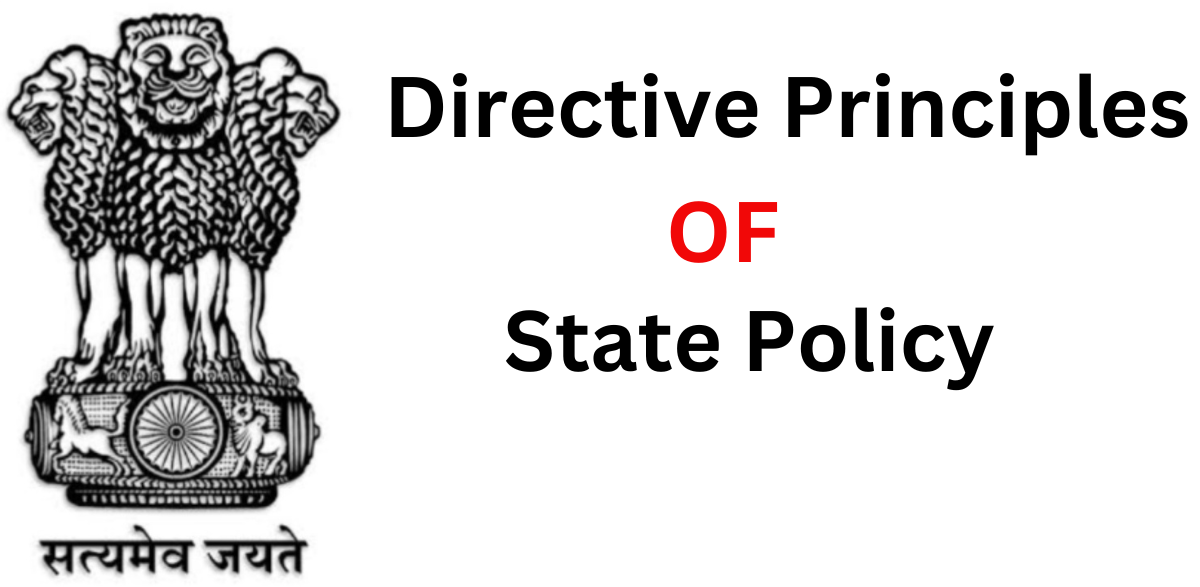Understanding the Directive Principles of State Policy (DPSP) is crucial for students preparing for upcoming government exams. DPSPs embody the socio-economic ideals that guide state policies and governance. Proficiency in this topic helps students grasp the constitutional obligations of the state towards citizens’ welfare, justice, and equality. It provides insights into the principles that shape public policy formulation, enabling students to analyze and evaluate the effectiveness of government initiatives. Moreover, familiarity with DPSP enhances students’ understanding of India’s democratic ethos and constitutional framework, facilitating success in government exams.

Also Read – 30 Major Amendments of Indian Constitution
Also Read – Rajya Sabha
Directive Principles of State Policy (DPSP)
Articles 36-51 of Part IV of the Indian Constitution deal with State Policy Directive Principles (DPSP).
Directive Principles of State Policy in India aim to create social and economic conditions under which the citizens can lead a good life and ensure social and economics democracy through a welfare state.
They are derived from the Constitution of Ireland, which had been copied from the Spanish Constitution.
Directive Principles of State Policy (DPSP) are non-justiciable; therefore, they cannot be enforced in court.
Background of Directive Principles of State Policy
- The DPSP and Fundamental rights have a common origin. The Nehru Report of 1928, which included some of the fundamental rights as well as certain additional rights, such as the right to education, that were not enforceable at the time.
- The Sapru Report of 1945 distinguished between justifiable and non-justifiable fundamental rights.
- The instrument of instructions contained in the Government of India Act, 1935 has been incorporated in the constitution of India in the year 1950 as Directive Principles of State Policy.
- The concept of DPSP originated in the Spanish Constitution and was incorporated into the Irish Constitution. The Indian Constitution was heavily influenced by the Irish nationalist movement, and the notion of DPSP was copied from the Irish Constitution in 1937.
NOTE:
Dr. B.R. Ambedkar described these principles as ‘novel features’ of the Indian Constitution.
Both the Fundamental Rights and the DPSP were included in all three drafts of the constitution created by the Drafting Committee, which was chaired by Dr. B.R. Ambedkar.
Features of Directive Principles of State Policy
- DPSP are not enforceable in a court of law.
- They were deemed non-justifiable given that the State may not have enough resources to implement all of them or it may even come up with some better and progressive legislation.
- The Directive Principles provide a highly comprehensive economic, social and political framework for a modern democratic State.
- They seek to realise the noble principles of justice, liberty, equality, and fraternity established in the Constitution’s Preamble.
- Although non-justiciable, the Directive Principles assist courts in assessing and determining the constitutionality of a statute.
- Many times, the Supreme Court has ruled that when determining the constitutionality of a law, if a court finds that the law in question seeks to give effect to a Directive Principle, it may consider such law to be “reasonable” in relation to Article 14 (equality before the law) or Article 19 (six freedoms), and thus save such law from unconstitutionality.
New Directive Principles of State Policy
- Following changes were made by 42nd Constitutional Amendment, 1976 in part-IV of the Constitution:
- Article 39A: To provide free legal aid to the poor.
- Article 43A: Participation of workers in the management of Industries.K1M
- Article 48A: To protect and improve the environment.
- The 44th Constitutional Amendment, 1978 inserted Section-2 to Article 38 which declares that; “The State, in particular, shall strive to minimize economic inequalities in income and eliminate inequalities in status, facilities and opportunities not amongst individuals but also amongst groups”.
- The 86th Amendment Act of 2002 changed the subject matter of Article 45 and made elementary education a fundamental right under Article 21 A.
Directive Principles of State Policy in Preamble
- The Preamble is a brief introduction to the constitution that incorporates all the aims that the drafters of the Indian Constitution had in mind.
- The phrase “justice – social, economic, and political” contained in the preamble is the goal that must be accomplished through the development of the DPSP.
- The DPSP is recruited to achieve the goal stated in the preamble, which is Justice, Liberty, Equality, and Fraternity, commonly known as the four pillars of the Indian Constitution. It also incorporates the concept of the welfare state, which was lacking during colonial administration.
Directive Principle of State Policy – Consequence
- The DPSP provides the philosophical groundwork for a welfare system. These ideas make it the state’s obligation to secure it through welfare legislation.
- Directive Principles serve as a guide for the government in developing policies and legislation to ensure the state’s fairness and welfare.
- Their disposition leans toward moral standards. They form a moral code for the State, but this does not lessen its significance since moral principles are highly essential and the absence of them may limit the evolution of a community.
- Directive Principles are good directives for the state that aid in safeguarding the social and economic components of democracy. The DPSP augments Fundamental Rights, which provide political rights and other freedoms.
Conflicts Between Fundamental Rights and DPSP:
Allied Cases
- Champakam Dorairajan v the State of Madras (1951): In this case, the Supreme Court ruled that since Fundamental Rights are enforceable and Directive Principles are not, so the Fundamental Rights would prevail over the latter and must run as subsidiary to the Fundamental Rights.
- Golaknath v the State of Punjab (1967): In this case, the Supreme Court declared that Fundamental Rights could not be amended by the Parliament even for implementation of Directive Principles.
- Kesavananda Bharati v the State of Kerala (1973): In this case, the Supreme Court overruled its Golak Nath (1967) verdict and declared that Parliament can amend any part of the Constitution, but it cannot alter its “Basic Structure”.
- Minerva Mills v the Union of India (1980): In this case, the Supreme Court reiterated that Parliament could amend any part of the Constitution, but it cannot change the “Basic Structure” of the Constitution.
Implementation of DPSP: Associated Acts and Amendments
- India’s Foreign Policy has also to some degree been influenced by the DPSP. India has in the past condemned all acts of aggression and has also supported the United Nation peace-keeping activities. India has also been in favour of nuclear disarmament.
- Judiciary has been separated from the executive in all the states and Union territories except Jammu and Kashmir and Nagaland.
- Legal aid at the expense of the State has been made compulsory in all cases pertaining to criminal law if the accused is too poor to engage a lawyer.
- The 86th constitutional amendment of 2002 inserted a new article, Article 21-A, into the Constitution, that seeks to provide free and compulsory education to all children aged 6 to 14. years. Right to Education (RTE) has also been implemented now.
- The Equal Remuneration Act of 1976 provides for equal pay for equal work for both men and women.
- The Minimum Wages Act of 1948 empowers the government to fix minimum wages for employees engaged in various occupations.
- Through 73rd and 74th Amendments to the constitution, (1991 & 1992 respectively). Panchayati Raj has been given constitutional status with more powers, Panchayati Raj now covers almost all states and Union territories.
- Welfare schemes for the weaker sections are being implemented both by the Central and state governments. In order that scheduled castes and scheduled tribes are protected from atrocities, the Government has enacted the Prevention of Atrocities Act, 1989 which provided severe punishments for such atrocities.
Directive Principle of State Policy – Criticism
- Directive Principles are being criticised due to its incorporation from age-old and foreign philosophical foundations based upon Fabian Socialist which almost lost its relevance in present day world.
- Directive principles are designed to serve as pious promises for creating an impression about the just and useful exercise of the power of the state. They aim to secure support by making promises and not through action.
- Many critics hold the view that their enumeration in Part IV has made things more complex and complicated as the principles stated here clearly mentioned in the Preamble of the Constitution
- Some of the principles are not practical in nature. Part IV includes some directives which cannot be implemented in actual practice. Haryana introduced prohibition but found it almost impossible to implement. The Haryana Government was therefore compelled to scrap it. Prohibition cannot be enforced by law because of the practical difficulties involved in the implementation of prohibition.
- The Constitution does not make them justiciable and neither fixes the time-limit within which these are to be secured, they are mere declaration of intentions which should be fulfilled by the State. According to the critic T. Shah they are “a cheque payable by the bank at its convenience.”
- The critics argued that there is lack of legal force while implementing these directives. The violation against these principles cannot be challenged in any court.
- The Directive Principle with the aim to promote international peace and friendly cooperation among all the nations lack intelligible guidelines for its implementations.
